The Future is DATA-DRIVEN HR
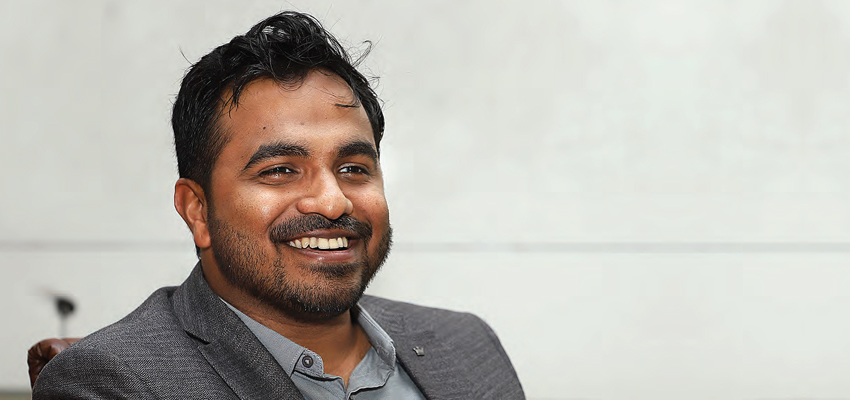
Passionate about using the combination of change management, HR technology and people analytics to drive a data-driven culture, Rahul Kolhe, Associate Program Manager AVP, HR Analytics and HR Transformation, eClerx, has over ten years of experience in management consulting, specialising in change and stakeholder management, HR analytics, technology transformation, thought leadership and building practices. Prior to eClerx, he was leading People Analytics and HR Advisory at Jombay, a Talent Assessment and Development Technology organisation. He has also worked as Senior Consultant with Deloitte’s Human Capital practice. Rahul Kolhe talks to Corporate Citizen, on change management, HR analytics and much more
From Engineering to HR
I am born and brought up in Pune and the best college in Pune is, of course, the College of Engineering, Pune (COEP), in fact one of the best engineering colleges in India. So, COEP was my target, when I had chosen engineering after my 12th grade. Did my BTech in Electrical Engineering, graduated in 2007 and from campus I got placed with IBM, where I worked as a SAP Basis consultant for a year.
How I went from electrical engineering to HR is that, during my time at IBM, while I was working on a client, a big auto OEM, I used to partner with all the functional consultants like HR Process, Material Management, Sales and Distribution. So, while understanding the big picture from a systems’ point of view, I realised that there is so much about HR processes that I had no clue about. Temperamentally, I have always been a good communicator and have been a student of studying people behaviour and the concepts of conflict resolution and driving a group of people towards a common goal.
I always wanted to use my creativity in a space where I was comfortable with and after getting exposure to SAP HR, I thought of marrying my understanding of technology and systems with people science. So, that’s when I decided to do my Masters in HR and got admitted to the Symbiosis Centre for Management and Human Resource Development (SCMHRD). Did my summer internship with ACC Cements and from there the CHRO of ACC Cements invited me to Reliance Power for a second year internship. By the time I finished the internship, I had got placed with Deloitte Consulting from campus.
The reason I chose Deloitte was, during the two years I was at SCMHRD while researching for assignments, Deloitte methodologies and whitepapers always use to attract my attention and I had then decided that if this company comes to campus I will target it. I worked in Deloitte for six years in change management, talent strategy and talent research. Honed my skills in stakeholder and project management through project assignments in the US, Belgium, Hong Kong and Singapore. After Deloitte, I wanted to explore other areas in HR and also wanted to come back to Pune. That’s when I got in touch with my fellow COEP alumni, Mohit Gundecha and Suruchi Wagh (co-founders of Jombay) and moved to Jombay.
Corporate Citizen: Over your decade long career journey in HR, what are the major changes you have experienced and how is data analytics, technology and AI changing the way how HR is being practised?
Rahul Kolhe: I have been in the consulting space throughout these ten years. One big change that I have seen is that earlier, the western market was around 10-15 years ahead in terms of adoption of HR technology. So, when we saw the WorkDay and SAP Success Factors revolution around 2013 with implementations across the US and the UK, Indian markets were still behind. With the big shift in favour of HRshared services models and a lot of startups making the HR technology market extremely competitive, Indian markets have caught up with the implementation of HR tech solutions and relying more on data-driven decision making. Use of Machine Learning and Artificial Intelligence (AI-ML) in HR processes and decision making has seen a big rise though still quite limited. AI-ML solutions are used in learning and development, hiring process automation, bot-led interviewing, predicting new hire performance and employee engagement, to name a few.
"We are in the midst of the 4th industrial revolution, which is software, robotics and machine learning. Gen Z, who are digital natives are poised to make the most of digital solutions"
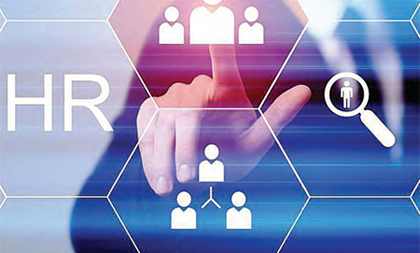
SCOPE FOR HR ANALYTICS
There is a lot of scope for HR analytics to grow further. Most organisations rely on reporting, basic dashboards and analysing past data. With more HR technology solutions permeating traditional HRMS and manual processes, quantum of available HR data is exponentially increasing. The bigger challenge is synching all datasets together – e.g. Leave & Absence, Payroll, Recruitment, Headcount, Promotions/Performance, etc. which have been traditionally maintained in independent databases. Cleansing the data and making sure it is accurate is also challenging. While a lot of reporting is being done, talent identification and management decisions for high potential identification, promotions, success profiling, etc. are becoming mainstream.
SUCCESS PROFILING
While in Jombay, one of the unique things that we were doing in analytics is called Success Profiling. For e.g. many organisations while hiring especially for the sales profile, they want to know what’s the guarantee the person would be a good fit for the company when it comes to the culture of the company. Then, if I hire someone based on an interview and a test, is that person going to be a high performer and how does one predict this? That predictability is something we work on, using Success Profiling.
What we do is, we study an incumbent population, a mix of high performers and low performers from any organisation for one role. Say, for example, it’s a sales profile and you want to hire sales managers we ask for sufficient size, say, 100 low performers and 100 high performers and we run our psychometric assessment/ talent assessment centre on them. From the talent assessment centre, you get to understand because you align it or customise it to their competency framework the behavioral aspect. Competency frameworks are nothing but a behavioural reflection of the company’s way of doing things that lead to success. When you measure competency scores, you gauge the behavioural potential about the success framework. We also take performance indicators for the last two years and then use regression analysis as a technique to find out which of these behaviours that we have measured as part of that competency framework are aligned to a high performer. That gives you a higher probability of success, both from a cultural fitment as well as predicted performance. If I am an interviewer and I want to save time, money and logistics on interviewing, I will focus on interviewing on the top 6-7 behaviours identified as high performance differentiators.
CC: Retention again is a big problem with millennials, their aspirations are different and their mindset is different. So how does analytics and AI work around these factors?
Retention is a factor of many parameters. For millennials, it is not the salary or the stability alone that matters, it is about what value they can add to a particular role, what are the growth opportunities that they have. How is their boss treating them? How is the working environment? What is the organisation doing for me personally? Is there a balance in the way they are working? Is there a career path? What new skills am I learning? Is the organisation flexible w.r.t. work-hours, location? Retention, thus, is tough to predict to a large extent. As an organisation, you can definitely come closer to a good fit. Investing in learning opportunities, setting up clear career paths, driving engagement initiatives, understanding employee and market pulse w.r.t. policies will help increase the chances of having satisfied, productive employees.
At Jombay, for one of the large pharma organisations, we did a success profiling exercise followed by a four-month virtual learning journey for new hires, using Jombay’s leadership development platform (iDev). The assessment platform helped the organisation identify success factors across various roles. For new hires, the assessment revealed their weaker competencies, which the four month learning journey would focus on. This customisation of requirements potentially would get a lot of buy in from new hires and the initial engagement would be high as well.
When we talk about learning and engagement, push-based learning (which is what most organisations follow) fizzles out over a period of time. Sustained learning = Engagement. Jombay uses the concept of “Practice Coaching” who interacts with learners, pushes notifications, analyses responses to learning module based questions and keeps a pulse check on learning milestones.
CC: Do you separately study the millennial mindset and are HRs using data analytics or AI, prepared for the next generation, the socalled Gen Z, who will be completely different from the millennials and requiring completely different approach?
If Gen X as managers thought that millennials (Gen Y) were tough, millennials will think that Gen Z is a pain. The reason is that each generation has its own set of growing up, values, understanding and what they want from a professional career. Like, Gen Y wants more of an experience and want to see how they make an impact for a Gen Z, it’s all about value. They look at what is the value that they are going to get out of an agreement/work contract. If I am going to get a positive value for myself then I will probably do this, else I will not. We are in the midst of the 4th industrial revolution, which is software, robotics and machine learning. Gen Z, who are digital natives are poised to make the most of digital solutions. Hence for HR, the preparation required is to rely more on digital solutions for driving the HR lifecycle than ever before.
"AI and Machine Learning are going to add a lot of jobs and create new jobs as well. However, the catch is, for the current workforce, there will be a period of reskilling and people who will not be able to adapt, will have a tough time"
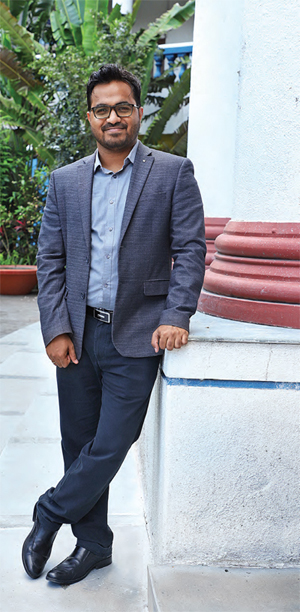
CC: Are millennial leaders changing the way how organisations functions, when it comes to organisation culture?
They are because millennials themselves place a lot of value on their own personal time. Now they use this personal time in two ways, one is, of course, they have their own life that they would look at and second is that they would want to learn new things. Millennials are insecure, as a result of the constantly changing work environment and technology trends. Machine Learning has existed for decades, but the popularity has increased exponentially only in the past 6-7 years. A millennial keeps asking: Am I relevant today? Am I going to be relevant tomorrow? That drives them constantly to explore new avenues. You have a variety of options now to learn and pick up new skills virtually. Millennials are changing organisational cultures, making them more dynamic and skill driven.
CC: There is a fast-changing workforce and then there are new work trends like flexi time demand, work-from-home, so how are these upcoming trends going to change how people are going to work in the future?
A lot of companies in the west, in the US and the UK have already started adopting these trends where they are reducing the number of workers, where they are allowing flexi time based on the requirement of that particular individual. For example, if someone is taking a skill based course in the evening and needs time off in the evening, they will have fixed hours that they work in the day and that’s fine now. Earlier, it used to be frowned upon and you would give it grudgingly. But, now that doesn’t have any bearing on performance.
A lot of the organisations in India are proprietary driven, founder driven MNCs are the ones that are at the forefront of these new work trends. When I was with Deloitte, we did have flexible timings and the focus was on getting the tasks done for the week. We also had workfrom home given as and when required and it was fine as it was built into the system. For Jombay as well, we did that.
These adaptations work well in the services sector like, IT, Consulting, Knowledge Services, etc. In the manufacturing sector, we still don’t know how to crack that, in future, it could be possible with the rise in tech like IoT, AI, robotics and Machine Learning we could have an influx of remote work options.
In the manufacturing sector, you have a huge number of assembly/field workers this sector is again going to get disrupted because you are going to have automation and AI change the whole face of it, in the next five ten years. Robotics and AI are going take away a lot of those type of jobs. Now the myth that we have is that the workforce is going to be out of jobs completely. Well, that’s not completely true AI and Machine Learning are going to add a lot of jobs and create new jobs as well. However, the catch is, the current workforce, which includes Gen X and millennials, fortunately, not the Gen Z because they are already learning skills, which are relevant for this market there will be a period of reskilling and reskilling would be anywhere between one three years. People who will not be able to adapt, will have a tough time.
In the Indian market as well, the explosion of e-Commerce and increased jobs are a mixed bag w.r.t. labour force. With the advent of Uber, Uber Eats, Swiggy, Zomato, you see a lot of young people getting into a delivery/service job a lot of college dropouts. While there are many jobs in that sector, but what’s eventually happening is, there is a risk of a large proportion of aspiring workforce ending up with outdated skills. If you see the type of high paying “entry level” jobs nowadays, most of them are in computer engineering and data science.
In every age, the market gives a lot of hints about upcoming changes that you need to adapt to. For e.g., when the “wheel” was invented, a lot of people who carried heavy goods for others found themselves out of a job (that’s a pre-historic commerce joke).
You don’t need a background in AI or data science, to be a data scientist or an AI specialist, you just need to reskill yourself and utilise your domain knowledge to the fullest. Now depending on who will align to it, they will get those new opportunities, but if not then they will struggle. But, there is another sector opening up, which is specialists: HR Specialists, Organisation Development Specialists, Marketing Specialists, Digital Marketing Specialists and so on. These specialist roles that are opening up give you another avenue.
"The trends that you see in the market, are here to stay. It requires a little bit more awareness for every one of us to reskill ourselves and that is, I think, is going to be the most challenging part"
CC: Are you saying the HR Generalist role is going to disappear and we will see more specialist HRs? Are we going to see the HR department shrink in the future, if the new techs are going to take over the transactional jobs?
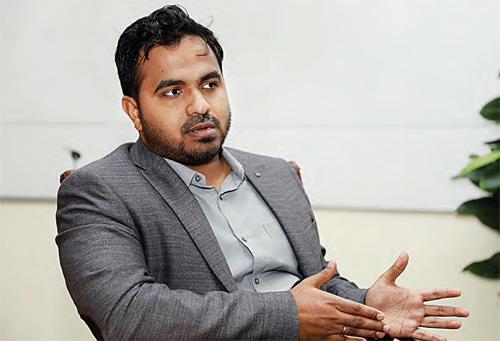
In the first wave what HR didn’t have was a robust data management system. You had People Soft, you had WorkDay, you had all of these new tech players come in and in the past 10-15 years, we have transformed the availability of HR data. So, now you have HR data and the two key areas that HR used to work was business partnering and administration. Now this administration can completely be taken of it’s all Employee Self Service (ESS) platforms, Managed Security Services (MSS) platforms and Performance Management System, has become a continuous process. So, those operational activities will get automated in due course of time. A lot of HR employees have skilled themselves in either tech, where they are working to manage the administration by being the end user on those HR systems. So, that’s the one way where the workforce can be absorbed into. The analyst roles have got replaced in a lot of ways by centralising all the processes, by creating Shared Services groups. HRSS (Human Resource Shared Services) has picked up now, in the past 6-7 years. In India, it is still little behind the western market, where you just have one team that panders to the entire process because they are using the technology to supplement information.
When I say specialist roles, what will happen is you will have some aspects of psychology and behavioural sciences move into this domain because the new workforce will need that support when it comes to stress management, health and wellness, etc. which is a big problem we have today as well.
A lot of people are now working in the space of HR Analytics, which is using all the data that is available, building the algorithms that will help you predict attrition, retention in some ways, fitment, employee satisfaction and learning outcomes. There is a lot of personalisation that is now going to happen. If you see in the past 2-3 years, most of the MBA institutes have started offering Data Science, Machine Learning or AI, as a field. There is still a lot of misconception, even today people don’t understand exactly what does AI or Machine Learning mean. The knowledge that people have on this subject is low, but in the next 5-8 years, it is absolutely going to enter everything that we do in our lives. It is scary it is the change management that we have to do as a generation, that we have never dreamt about before. So, the trends that you see in the market, are here to stay. It requires a little bit more awareness for every one of us to reskill ourselves and that is, I think, is going to be the most challenging part.
"Traditionally, most organisations have relied on the command-and-control type of business models, and now need to trust distributed workforces to be productive"
CC: Talking about leadership development among the millennials for the future, are there new strategies that the HRs are using, especially for women leadership?
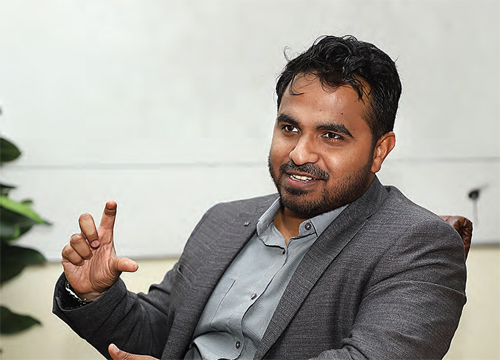
One thing that has definitely changed over the past is a higher number of women getting into senior leadership roles and the C-Suite level. You see a lot more women entrepreneurs and leaders in the industry today. So, that’s definitely something that’s changed. Startups are at the forefront, but other organisations, especially, MNCs have been driving this for few years, with their focus on women leaders and women leadership programmes. For example, in Deloitte in the US, we had a special women leadership council and there was a special focus on developing women consultants as leaders.
Traditionally, there is a belief that after mid 30s or early 40s, a large proportion of women executives leave the workforce to focus on family. This is changing firstly, with flexibility options with respect to work hours and work location. A few organisations have crèches inside the office itself. They have a kind of full support system inside, you can visit the crèche and come back and work. So, you have all of these support facilities that are coming up. But we sure do have a long way to go.
In HR, you have an increasing proportion of women CHROs, but it is still not as good a number as you would want it. Sustained efforts by organisations, governments and technology adaptations will definitely boost opportunities.
Q: Has the Covid-19 pandemic changed the situation for the HRs and speed up digitalising their processes? How are organisations coping with the new change?
Most definitely! For the past few years, digitisation has been a key theme resonating within multiple industries; BFSI and manufacturing sectors have been at the forefront of digitisation. But the pandemic has exponentially accelerated this process. Microsoft’s CEO, Satya Nadella rightly said, “We have seen two years’ worth of digital transformations in two months”. HR is no different. Rapid digitisation is taking place across recruitment, screening, onboarding, employee self-service, virtual learning, remote work and project management solutions, virtual engagement etc.
Organisations are asking questions like, what percentage of tasks can be done productively remotely? What types of work do we need to be together to do? How do we keep motivation levels high? How do we keep collaborating effectively in a virtual setup? How do we make sure that mental health doesn’t suffer? For HR, the key questions are around employee experience, employee well-being, continuous learning and skill development in a virtual setup and driving a sense of belonging.
Overall, it seems like there will be a paradigm shift in the way remote and hybrid working models evolve with the spotlight on HR to become more digital, more agile and more data literate to drive more business value.
Q: With remote working becoming the new normal, are we looking forward to more big changes in work culture and organisation culture?
Most definitely what the Covid-19 pandemic has revealed is that organisations and employees can adapt quickly in crisis situations. We are currently witnessing the largest remote working experiment in history. While remote working and remote workplaces have been around for a few years, especially in startups, consulting and service organisations, the pandemic has forced organisations across sectors to equip remote working and work from home options for employees. Remote working and hybrid working models are here to stay.
Transforming work culture is now a challenge of applying a ‘systems thinking’ mindset. Traditionally, most organisations have relied on the command and control type of business models and now need to trust distributed workforces to be productive. Organisations will need to rely more on the benefits of automation, using newer tools of collaborative working, developing a high AQ (Adaptability Quotient) and keeping employees at the ‘centre